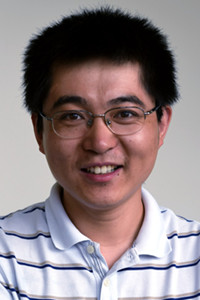MTL welcomes Prof. Luqiao Liu. An expert in the properties of magnetic materials and their application to non‐volatile memory and spin based logics,his research aims to use spin based electronics to solve the power, scaling and speed issues associated with conventional semiconductor devices.
 Professor Luqiao Liu joined the EECS department at MIT in July, as an assistant professor. He has also joined MTL as a core member and a resident member, with his lab and office in Building 39. He received his BS in physics from Peking University, Beijing, in 2006 and his PhD in applied physics from Cornell University, Ithaca, NY, in 2012. Prior to joining MIT, he was a research staff member in the magnetic random access memory (MRAM) group of IBM T. J. Watson Research Center. Professor Liu's research focuses on exploring new materials and mechanisms that can be used as building blocks for spintronic devices,
Professor Luqiao Liu joined the EECS department at MIT in July, as an assistant professor. He has also joined MTL as a core member and a resident member, with his lab and office in Building 39. He received his BS in physics from Peking University, Beijing, in 2006 and his PhD in applied physics from Cornell University, Ithaca, NY, in 2012. Prior to joining MIT, he was a research staff member in the magnetic random access memory (MRAM) group of IBM T. J. Watson Research Center. Professor Liu's research focuses on exploring new materials and mechanisms that can be used as building blocks for spintronic devices,
which operate at high speed with low power consumption.
Spintronic devices are proposed as one possible alternative to current CMOS technology because of their non-‐volatility nature, the potential to achieve lower power consumption as well as the possibility of achieving higher operating speeds. Currently, the energy efficiency of spin based devices, such as magnetic memories, remains poor compared with most of their CMOS counterparts, mainly because of the large, dissipative charge currents associated with the generation of spins. In addition, due to the slow dynamics of ferromagnets, the operating speed of spintronic devices is also inferior to that of semiconductor devices.

(b) Schematic of a single magnetic memory cell which uses the excessive spins generated from heavy metal (Ta) to flip the orientation of the magnetic layer and hence to write information into the cell. The information is read out as a resistance between the top fixed magnetic layer and the bottom switchable magnetic layer.
At MIT, Professor Liu's research group will investigate spin-‐orbit interaction in solid-‐state materials through the spin-‐Hall effect or its quantum version - topological insulators, to achieve efficient spin current generation and magnetic moment switching. Since the operation of spin-‐orbit electronics (or, Spin Orbitronics) is realized with pure spin currents rather than charge currents, much lower power consumption compared with conventional devices should be achievable. Prof. Liu will also explore possible applications of spin orbitronic devices both as memory components and logic devices. His group will also look into the mutual interaction between electron charge and spin in various material systems such as antiferromagnets and superconductors, and evaluate the possibility of utilizing these phenomena to realize novel spin based electronics.
--Microsystems Technology Laboratories